Bursell Surname Ancestry ResultsOur indexes 1000-1999 include entries for the spelling 'bursell'. In the period you have requested, we have the following 29 records (displaying 11 to 20): Single Surname Subscription | | | Buying all 29 results of this search individually would cost £174.00. But you can have free access to all 29 records for a year, to view, to save and print, for £100. Save £74.00. More... |
These sample scans are from the original record. You will get scans of the full pages or articles where the surname you searched for has been found. Your web browser may prevent the sample windows from opening; in this case please change your browser settings to allow pop-up windows from this site. Freeholders of land in Kenilworth in Warwickshire
(1820)
A poll of freeholders of more than 40s per annum of land, to elect a member of parliament for Warwickshire, was held at Warwick 31 October to 7 November 1820. This poll book, listing the voters for each township, parish or borough, was published under the inspection of J. W. Unett, agent for Francis Lawley, one of the candidates, in 1821. In each area the voters are listed by initial letter of surname, with abode (often elsewhere), and whether they voted for Lawley or for his opponent, Richard Spooner.BURSELL. Cost: £6.00.  | Sample scan, click to enlarge
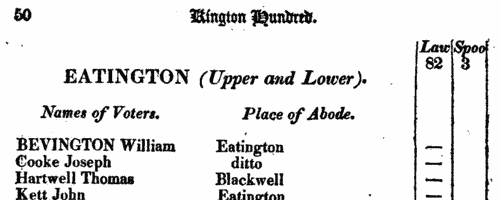
| Electors in Hull
(1835)
A poll was taken 6 and 7 January 1835 for the election of members to serve in Parliament for the borough of Kingston-upon-Hull, the candidates being Matthew Davenport Hill, William Hutt and David Carruthers. This poll book lists all the electors in the wards of Hull (St Mary's, North, Trinity, Whitefriar, Humber, Austin, and South Myton), in Sculcoates, and in Sutton, Southcoates, Drypool &c. In each ward the names are arranged in five sections: Householders and Burgesses occupying Ten Pound Households; Burgesses not occupying Ten Pound Households; Unpolled Voters residing in the ward; Unpolled Freemen; and Non-Resident Freemen not polling. There are also short lists of votes that were tendered but the validity of which remained uncertain. In all cases full names and addresses are given: where electors voted, their votes are indicated in the right-hand columns, the numbers shown there being their numbers in the cumulating totals for each candidate. After the name of each voter there is an italic a or b showing whether he voted on the first or second day. BURSELL. Cost: £4.00.  | Sample scan, click to enlarge
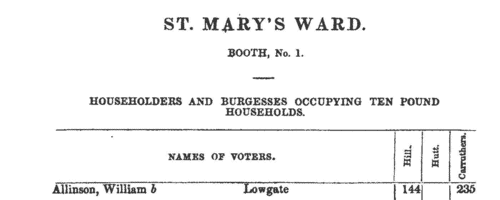
| London and Middlesex crimes tried at the Central Criminal Court: the accused
(1835)
Henry Buckler copied in shorthand the proceedings of trials at the Central Criminal Court in London, and his transcripts were printed. This volume (iii), from 1836, covers sessions i to vi of the Copeland mayoralty of 1835 to 1836. The bulk of the cases were from London and Middlesex, with separate sections for Essex, Kent and Surrey, but, preceding all these, Capital Convictions. The names of the accused are annotated with an asterisk to show if they had previously been in custody; an obelisk indicates a known associate of bad characters. Most cases resulted in a guilty verdict, and a large proportion of these led to a sentence of transportation to Australia. This index covers those accused in the London and Middlesex cases of December 1835.BURSELL. Cost: £6.00.  | Sample scan, click to enlarge
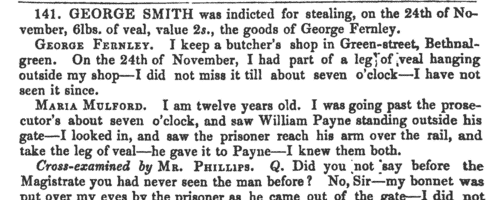
| Dissolutions of Partnerships
(1838)
Trade partnerships dissolved, or the removal of one partner from a partnership of several traders, in England and Wales
BURSELL. Cost: £6.00.  | Sample scan, click to enlarge

| Proprietors of Hull Banking Company
(1838)
The provincial banks of England and Wales made annual returns to the Stamp Office of their proprietors or shareholders. These returns, registered in March 1838, from the 103 banks then in existence, contain the full names and addresses of about 30,000 shareholders.BURSELL. Cost: £6.00.  | Sample scan, click to enlarge
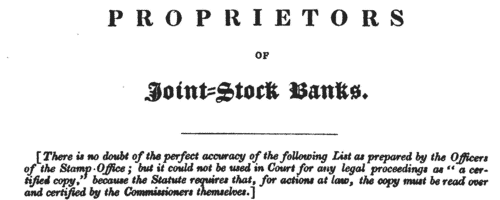
|  Merchant Seamen
(1835-1844) Merchant Seamen
(1835-1844)
At this period, the foreign trade of ships plying to and from the British isles involved about 150,000 men on 15,000 ships; and the coasting trade about a quarter as many more. A large proportion of the seamen on these ships were British subjects, and so liable to be pressed for service in the Royal Navy; but there was no general register by which to identify them, so in 1835 parliament passed a Merchant Seamen's Registration Bill. Under this act a large register of British seamen was compiled, based on ships' crew lists gathered in British and Irish ports, and passed up to the registry in London. A parliamentary committee decided that the system devised did not answer the original problem, and the original register was abandoned after less than two years: the system was then restarted in this form, with a systematic attempt to attribute the seamen's (ticket) numbers, and to record successive voyages. The register records the number assigned to each man; his name; age; birthplace; quality (S = seaman, &c.); and the name and official number of his ship, with the date of the crew list (usually at the end of a voyage). Most of the men recorded were born in the British Isles, but not all. The system was still very cumbersome, because the names were amassed merely under the first two letters of surname; an attempt was made to separate out namesakes by giving the first instance of a name (a), the second (b), and so on. In this volume the register is restarted from 1840 onwards, with the mariner's previous number (if any) being entered in the column after his birthplace. In the event of it becoming known that a man had died during the course of a voyage, that information is written across the remaining empty columns. This volume (BT 112/10) covers mariners whose surnames start with Bu and By (and McBu and McBy).BURSELL. Cost: £8.00.  | Sample scan, click to enlarge

| Inhabitants of Kenilworth in Warwickshire
(1850)
Francis White & Co.'s History, Gazetteer, and Directory of Warwickshire for 1850 lists nobility, gentry, clergy, other private residents, farmers and traders, hundred by hundred and village by village, with separate sections for the large towns.BURSELL. Cost: £6.00.  | Sample scan, click to enlarge

| Inhabitants of Welford in Warwickshire
(1850)
Francis White & Co.'s History, Gazetteer, and Directory of Warwickshire for 1850 lists nobility, gentry, clergy, other private residents, farmers and traders, hundred by hundred and village by village, with separate sections for the large towns.BURSELL. Cost: £6.00.  | Sample scan, click to enlarge

| Hare Coursing Competitors at Kenilworth (1856)
Names of competitors from results recorded in the Coursing Calendar for September to December 1856; in which the meetings are listed chronologically, giving precise dates and the names of the presiding officers (stewards, judge, slipper, field officer, secretary). In each heat two greyhounds are raced, the winner from each pair proceeding to the next heat. Each dog is identified by its name and that of its owner. The parents of the winning dog are usually stated. The name of each competition is given with the number of nominations, the stakes and prizes. There are also occasional matches between particular dogs. These abbreviations are used: b. bitch; bd. brindled; be. blue; bk. black; br. l. broken leg; cr. cream; d. dog; dn. dun; dr. (with)drawn; dr. l. drawn lame; f. fawn; gr. grey; p. puppy; r. red; t. ticked; tn. tanned; w. white.
BURSELL. Cost: £8.00.  | Sample scan, click to enlarge
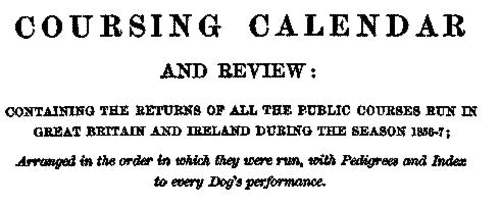
| Long-stay Paupers in Workhouses: St Marylebone
(1861)
This comprehensive return by the Poor Law Board for England and Wales in July 1861 revealed that of the 67,800 paupers aged 16 or over, exclusive of vagrants, then in the Board's workhouses, 14,216 (6,569 men, 7,647 women) had been inmates for a continuous period of five years and upwards. The return lists all these long-stay inmates from each of the 626 workhouses that had been existence for five years and more, giving full name; the amount of time that each had been in the workhouse (years and months); the reason assigned why the pauper in each case was unable to sustain himself or herself; and whether or not the pauper had been brought up in a district or workhouse school (very few had). The commonest reasons given for this long stay in the workhouse were: old age and infirm (3,331); infirm (2,565); idiot (1,565); weak mind (1,026); imbecile (997); and illness (493). BURSELL. Cost: £6.00.  | Sample scan, click to enlarge

|
Research your ancestry, family history, genealogy and one-name study by direct access to original records and archives indexed by surname.
|













